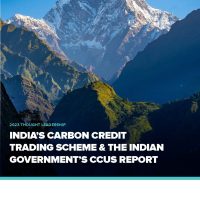10 AM EDT (Washington D.C.) | 3 PM BST (London) | 4 PM CEST (Brussels) | 6 PM GST (Abu Dhabi)
Carbon capture and storage is steadily making its way into national and international climate policy discussions and actions, as illustrated in the latest political positioning on CCS issues through the Carbon Management Challenge, G7 and G20 activities.
Ahead of COP28, CCS has been receiving multilateral attention. During the Bonn Climate Conference, the technology was explicitly mentioned in a number of channels and formal negotiations, including during discussions under the Global Stocktake and the Mitigation Work Programme. The IPPC AR6 Synthesis Report – which will inform the Global Stocktake, and subsequently, Nationally Determined Contributions – noted that CCS is a climate tool that can support emissions reductions from fossil-based energy and industry sources.
With India holding the G20 Presidency this year, the country itself has taken strides to heighten climate ambitions, including through the approval of a domestic carbon credit trading scheme. The government has further strived to build opportunities for CCUS research, development and collaboration, as was illustrated in a government policy report titled ‘CCUS: Policy Framework and its Deployment Mechanisms in India’, released in late 2022.
Join the Global CCS Institute as our experts unpack the current state of CCS within international and national policy frameworks, highlighting key findings from recently published thought leadership reports tied to India and the G20 Presidency, and the upcoming COP28.
Speakers
- Errol Pinto - Senior Consultant, Policy and Commercial, Global CCS Institute
- Dr. Vikram Vishal - Associate Professor at the Department of Earth Sciences, IIT Bombay and Visiting Professor at the Massachusetts Institute of Technology (MIT)
- Noora Al Amer - Senior International Climate Change Policy Advisor, Global CCS Institute
- Ruth Gebremedhin (moderator), Advocacy and Communications Manager EMEA, Global CCS Institute


